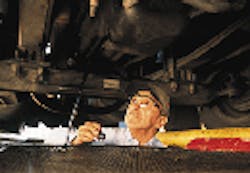According to new analysis by Frost & Sullivan, the commercial fleet industry as currently constructed is incapable of dealing with rising fuel costs, vehicle-related legislation and a mounting workload, and needs to adjust to the changing market.
The report, Maximizing Opportunities in a Challenging Service Industry, said that fleets must focus on efficiency as freight volumes are projected to grow 6% annually and profits will continue to be squeezed.
The demand for replacement services and maintenance support has increased, putting strain on the aftermarket service industry, Frost and Sullivan said, which results in a challenging environment but the possibility for several attractive opportunities.
According to Frost & Sullivan senior consultant Mary-Beth Kellenberger, the aftermarket overall is hurt by customers increasing their timeframe for maintenance--therefore spending less on aftermarket parts--but in the heavy-duty truck sector, fleets are more likely to replace parts than buy new trucks.
“Historically, fleets would have done one engine repower, but now you invest so much money in these vehicles, that you might repower a second time and drive the trucks until they die,” Kellenberger told FleetOwner. “People are adjusting how they’re using their vehicles.
“The North American heavy-duty truck aftermarket currently offers tremendous growth opportunities to both the product and service segments,” Kellenberger said. “The distribution structure faces changes to the competitive landscape and market dynamics, while the product side must adapt to pressures emanating from increasing vehicle electronic content and the introduction of proprietary technologies by truckmakers.”
One of the largest issues facing the industry is the lack of qualified technicians, Kellenberger said, as the number of fleets performing on-site repairs and complex system maintenance has decreased, instead bringing vehicles to independent repair facilities and dealers.
Kellenberger said the overall number of technicians is likely to increase, but those in the industry worry about the decreased skill level and quality of technicians in the commercial vehicle industry, as workers have been deterred by a low wages, dirty work environment and a lack of resources.
“The industry is able to meet customers’ needs at this time, but every shop we’ve communicated with recently is looking for quality technicians,” she said. “Everybody’s looking, although I don’t think its hysteria at this point.”
Kellenberger added that fleets, unlike the general public, cannot afford to wait an extra day to get their vehicles maintained. “Bay time is becoming a bigger problem for heavy-duty—they have to keep the truck running, and if it’s there on Wednesday, it needs to be serviced on Wednesday.”
“Success is going to come through individual companies and how they put together programs,” she said. “Technology is going to play a role, as well as the resources we give technicians.”
